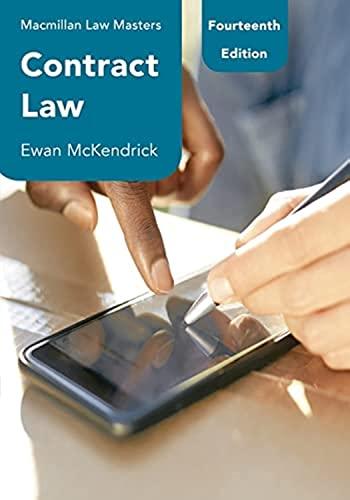Question
Question 1: What is a difference between the Supremacy Clause and preemption? a) Preemption depends on congressional intent, the Supremacy Clause does not. b) Preemption
Question 1: What is a difference between the Supremacy Clause and preemption?
a) Preemption depends on congressional intent, the Supremacy Clause does not.
b) Preemption displaces federal laws; the Supremacy Clause applies to state laws.
c) Preemption only applies if there is an express statement from Congress, the Supremacy Clause applies any time a state law conflicts with federal requirements.
d) Preemption cannot be altered by congressional intent, the Supremacy Clause can.
Question 2: When is a state law preempted by federal law?
a) When a federal law expressly states that it supersedes state law.
b) When Congress intends to comprehensively regulate a particular area of law and leaves no room for state law.
c) When federal law and state law conflict.
d) All of the above
Question 3: State X passes a law that allows the children from other countries to remain in the state for up to three years before becoming a state citizen. Is the law preempted?
Question 3 options:
a) No, because states can pass laws regarding state citizenship and can exclude individuals that are not state citizens.
b) No, because the 10th Amendment gives states the right to determine who enters their state.
c) Yes, because immigration is an area where the federal government has comprehensively regulated and occupies the field.
d) Yes, because it conflicts with federal requirements.
Question 4: When does a state law violate the dormant commerce clause doctrine?
a) When it regulates interstate commerce.
b) When it discriminates against out-of-state commerce based on economic protectionism.
c) When it involves a fundamental interest.
d) When it buys and sells goods.
Question 5: Due to mold findings on out-of-state corn, State X law requires all corn imported for sale to be inspected to determine if it is contaminated with mold. State X law does not require in-state corn to be inspected because no mold has been found on in-state corn, and the state has various laws that apply to in-state corn producers to address mold. These laws cannot be enforced against out-of-state producers because they require on-site inspections of corn growing and storage facilities. The requirement
a) Violates the dormant commerce clause doctrine.
b) Violates the Privileges and Immunities Clause.
c) Is preempted by federal law.
d) Is permissible since the state has a legitimate health and safety concern regarding out-of-state corn, and there are no less discriminatory means provided in the facts to address the concern.
Question 6: The State of Colorado purchases several thousand tons of apples each year for various uses at state facilities. It always purchases the apples from in-state vendors even though out-of-state vendors have placed lower bids to try to get the state's business.
a) The state's actions violate the dormant commerce clause doctrine.
b) The state's actions do not violate the dormant commerce clause doctrine because they are a market participant.
c) The state's actions violate the dormant commerce clause doctrine because of its downstream effect.
d) The state's actions do not violate the dormant commerce clause because they do not discriminate against out-of-state vendors.
Question 7: The State of Michigan charges in-state citizens $25 for a snowmobile license to drive on state trails. It charges out-of-staters $50 for the same license.
a) The different treatment violates the Privileges and Immunities Clause.
b) The different treatment violates the dormant commerce clause doctrine.
c) The different treatment does not violate the Privileges and Immunities Clause because it is a recreational activity.
d) The different treatment does not violate the Privileges and Immunities Clause because it is not commerce.
Question 8: In Pike v. Bruce Church, Inc., the Court ruled
a) If a law is directed at legitimate local concerns and only has incidental effects on interstate commerce, then it is constitutional.
b) If a law is directed at legitimate local concerns and only has incidental effects on interstate commerce, then it is unconstitutional.
c) The state has the burden to prove that a law has incidental effects on interstate commerce when it does not discriminate.
d) If a law is directed at legitimate local concerns and only has incidental effects on interstate commerce, then it discriminates against commerce.
You
30 minutes ago
Please dont use AI last time the tutor made me miss 3 question and fail
Step by Step Solution
There are 3 Steps involved in it
Step: 1

Get Instant Access to Expert-Tailored Solutions
See step-by-step solutions with expert insights and AI powered tools for academic success
Step: 2

Step: 3

Ace Your Homework with AI
Get the answers you need in no time with our AI-driven, step-by-step assistance
Get Started


